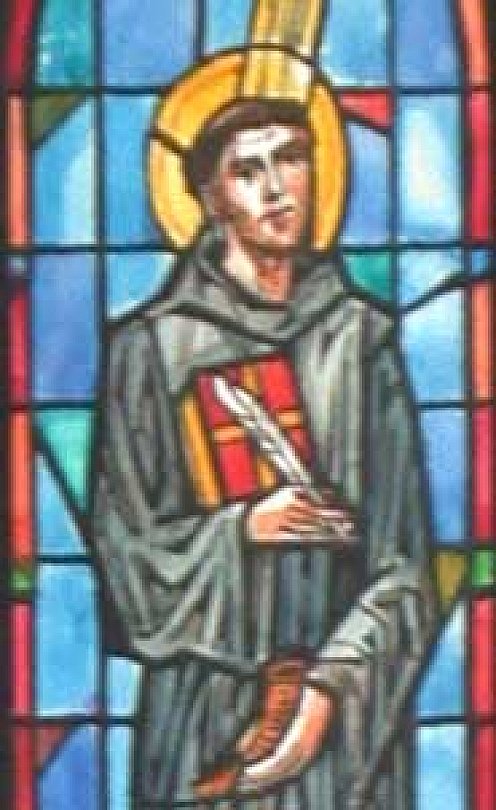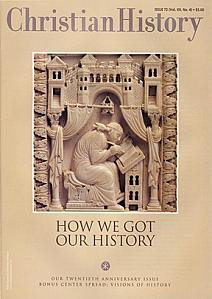Bede, the Father of English History, Chanted a Hymn and Died

Stained glass window provides an imaginary depiction of England's first notable historian.
BEDE IS KNOWN as “the venerable.” What earned him the nickname? And how did he earn his other, equally famous nickname, “Father of English History”?
In an autobiographical sketch, Bede tells us he was born on the lands of the monastery of Peter and Paul at Wearmouth and Jarrow. “On reaching seven years of age, I was entrusted by my family first to the most reverend Abbot Benedict and later to Abbot Ceolfrid for my education.” Perhaps his parents died young, because he never left the monastery:
I have spent all the remainder of my life in this monastery and devoted myself entirely to the study of the scriptures. And while I have observed the regular discipline and sung the choir offices daily in church, my chief delight has always been in study, teaching and writing. I was ordained deacon in my nineteenth year, and priest in my thirtieth.
While he was still a young man, plague wiped out most of the monastic choir. This seems to have aided Bede’s swift rise to a position of leadership in the community. His gentle, pious character and deep love of learning made him beloved with both the students and the monks.
Although Bede wrote Bible commentaries and other works, his most enduring composition was his Ecclesiastical History of the English Nation. Backed up with documents he had himself read, it is our best source of material on Christianity in England up to the eighth century. Bede selected his anecdotes with care and accepted accounts of miracles, which he relayed to his readers.
At the end of his life he made some excerpts from Isidore of Seville and finished a translation of the Gospel of John, which unfortunately has been lost. He was suffering from a lung infection at the time. Knowing he would soon die, he urged his pupils to learn quickly. He warned them that it is a fearful thing to fall into the hands of the living God.
At the end, he divided a few possessions among his fellow monks, including a little expensive pepper. With characteristic faith, he thanked God for his pains, which he said were the scourging of a loving Father.
On this evening, 26 May 735, his secretary, a young boy named Wilbert, said, “Dear master, there is one sentence still unfinished.”
“Very well,” replied Bede, “write it down.” When the boy said, “Now it is finished,” Bede replied, “You have spoken truly. It is well finished. Now raise my head in your hands, for it would give me great joy to sit facing the holy place where I used to pray, so that I may sit and call on my Father.”
Chanting “Glory be to the Father and to the Son,” he died. His pupils recognized the importance of the event and wrote a widely circulated letter documenting his last hours.
—Dan Graves
----- ------ ------
Christian History #72, How we got our history, has an article on Bede, "When God Came to England"






